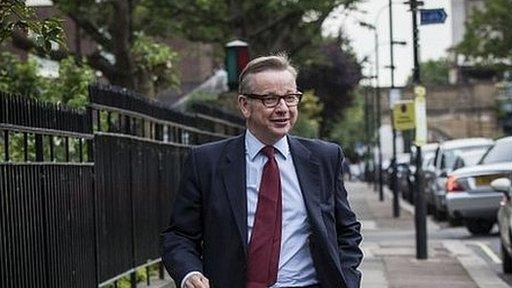Michael Gove: Radical, controversial, divisive
- Published
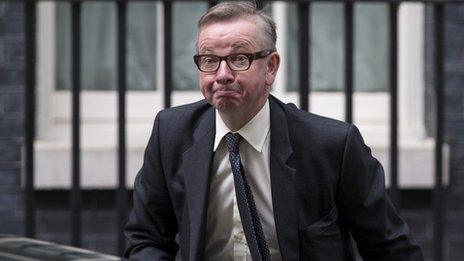
Michael Gove, in Downing Street on Tuesday, has been education's great divider
Last week Michael Gove was the headline act at an international education conference - where a former senior Labour adviser, Sir Michael Barber, hailed him as one of the four most influential education secretaries since the Second World War.
Looking at the reaction from teachers on Twitter, staffrooms across England might hear some other less flattering accolades.
"The worst education secretary in living memory," is one of the more polite comments.
Both reactions are a testimony to how much he has come to dominate the education debate - as, in a breakneck four years, he turned most secondary schools into academies and re-wrote the exam system.
His radical interventions were often very personal, carrying the flavour of his own upbringing, passions and prejudices.
And the opposition against him was often equally personal. It was his name that appeared on protest banners when teachers went on strike.
Traditional exams
Even the re-shaping of the curriculum - and the removal of US authors from literature set texts - became a debate about Mr Gove's reading preferences.
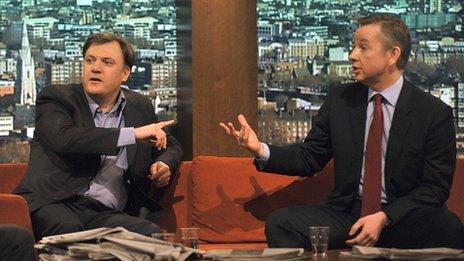
Michael Gove and Ed Balls sparring before the 2010 election
He repeatedly placed himself in a line of education reformers - often outside the Conservative party, including Tony Blair and Lord Adonis.
And he said he had made it his "personal crusade" to close the gap between the educational attainment of rich and poor pupils.
The smoke of battle obscured the significance of how much energy and attention, from a Conservative-headed government, was focused on raising standards in non-selective state schools, with almost no diversionary forays into grammar schools, voucher schemes or funding private places.
What will be his legacy?
Almost 60% of secondary schools are now academies. There are more than 300 free schools open or approved. It's unlikely that any incoming government would remove much of the autonomy of these schools.
After a chaotic start, with GCSEs being scrapped and then reinstated, the qualifications system in England has been re-drawn, moving back to a more traditional, exam-based model.
The curriculum has been rewritten - always with some controversy thrown into the mix and often with some idiosyncrasy.
The draft version of the primary history curriculum, including teaching eight-year-olds about the heptarchy (the seven kingdoms of the Anglo-Saxons), was mocked by the teachers' unions as training for a pub quiz.
Global competition
It remains to be seen how much of the detail might be unpicked in his absence - but he gave a strong sense of momentum towards greater academic rigour.
And his re-invention of school league tables - away from the unyielding reliance on five good GCSEs - could be an unexpected and long-lasting influence.
Another unintended by-product of all this upheaval is that the English education system, already separate from Scotland, is now fundamentally different from Wales and Northern Ireland.
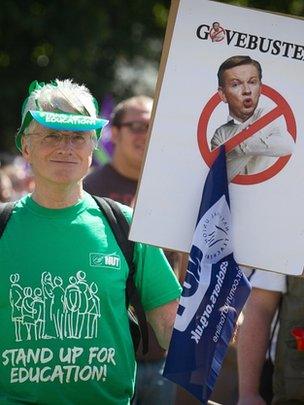
Michael Gove attracted a hostile reaction from teachers
An under-recognised change, with far-reaching ramifications, has been his emphasis on wanting England's schools to catch up with international competitors. In the flurry of announcements it was almost overlooked that for the first time England's GCSEs are to be pegged against the global benchmark of Pisa tests.
But the question that will hang over his legacy is whether his divisiveness was counter-productive. He couldn't seem to resist the confrontational comment, and his instincts seemed disputatious.
He had a toxic relationship with the teachers' unions that meant that every reform was greeted with hostility. He mocked the educational establishment as the Blob - but at the same time these were the people who were going to have to put his words into action.
A remarkable one in 12 of England's entire female workforce has a job in a school - they might not be a group to antagonise if you're chasing women's votes in an election.
Mr Gove made the news around him - but a peculiarity of his time in office was that he rarely gave the type of press conferences and open briefings that had been expected of education secretaries announcing major changes.
Many of his policy revolutions were revealed overnight in the columns of supportive newspapers - almost as if he were still in opposition.
This might have had its roots in the awkward start to his time in office, when his attempts at reforming the school buildings programme turned into a public mess.
But it meant that this most fluent and stylish of communicators tended to devote his energies to the already converted. They took him to their hearts and gave him a vocally supportive following, but it meant he gained few allies outside his own insurgent circle.
And his critics continued to accuse him of hidden shallows - relying on caricatures rather than engaging with those who disagreed with him.
It only seemed to be more recently that he seemed to want to talk more widely.
His reign in education might be over, but arguments over his impact have only just begun.
- Published15 July 2014
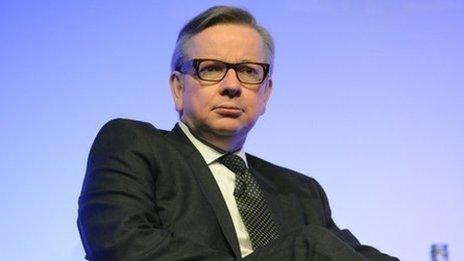
- Published15 July 2014
